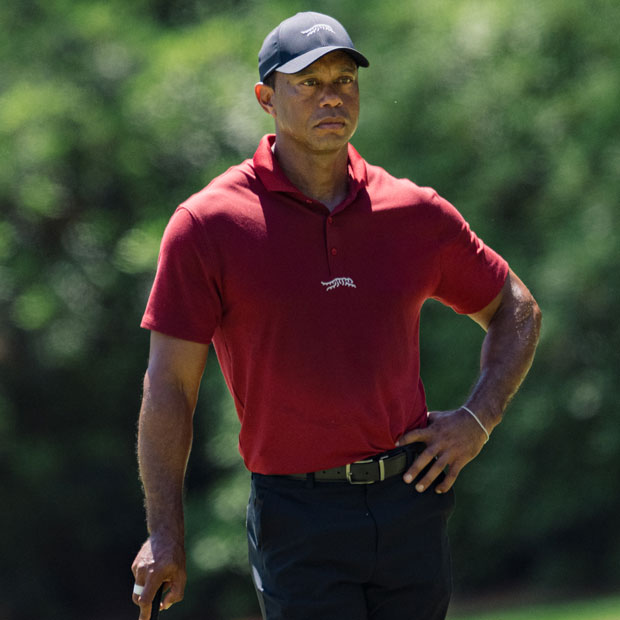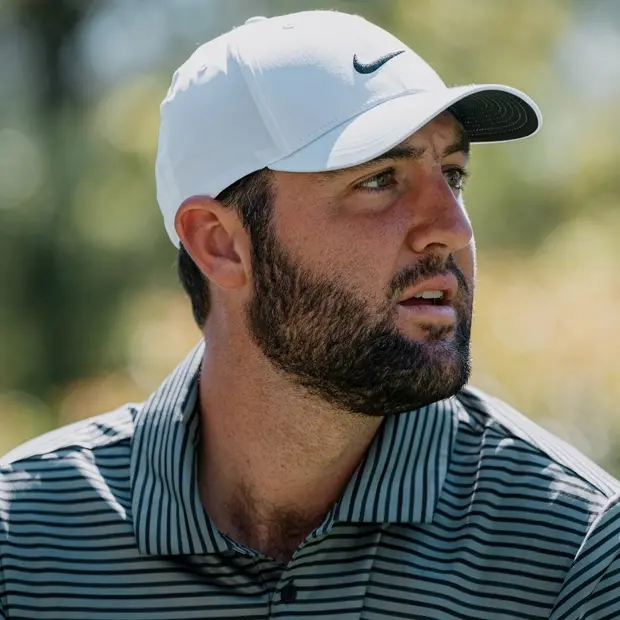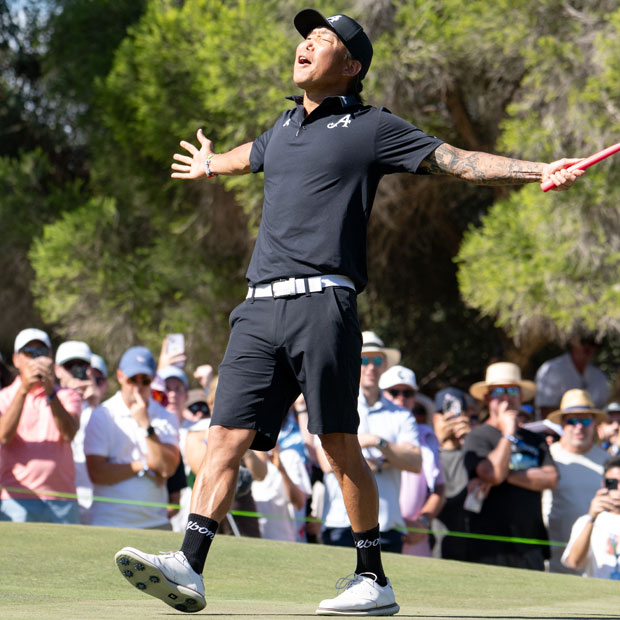Is a Golf Betting Scandal Inevitable?
The PGA Tour is leaning hard into gambling, but as we're seeing with major scandals in other sports, that comes with risk


On Monday evening, ESPN broke the news that Jontay Porter, a 24-year-old forward on the NBA’s Toronto Raptors, has been placed under investigation related to suspicious gambling activity. This is hardly the first recent case of an athlete getting wrapped up in a gambling scandal. To name a few, NFL player Calvin Ridley was suspended for gambling in 2022, the Temple college basketball team is actively under investigation for suspicious betting activity, MLB superstar Shohei Ohtani accused his interpreter this week of stealing $4.5M of his money and wiring it to a bookmaker, and professional golfers Jake Staiano and Vince India were suspended by the PGA Tour last October for placing bets on golf tournaments in which they were not participating.
The vast majority of retail sportsbooks impose limits on successful gamblers. A problem gambler who consistently loses thousands of dollars might be able to bet $5,000 on an NFL game, while the tiny fraction of gamblers who actually place profitable bets will be quickly identified and limited to making bet sizes that are much smaller. Point being: sportsbooks’ only motivation is profit, and they track everything.
Jontay Porter is under investigation because bettors absolutely smashed some of his prop bets in two NBA games in which Porter played fewer than five minutes before exiting the games with an “eye injury” and an “illness”, respectively. The bettors gambled on Porter’s unders, meaning they bet on stuff like “Porter will score fewer than 5.5 points” and “Porter will have fewer than 4.5 rebounds.” DraftKings Sportsbook reported that Porter prop bets were the biggest moneymakers each of those nights in the NBA, meaning people placed eyebrow-raising sums of money on Porter performing poorly in each game. Awfully suspicious!
Was Porter complicit? Did he fake an eye injury and an illness in exchange for money that gamblers were sure to make from betting against him on DraftKings? We need to let the investigation unfold before reaching conclusions, but the activity is highly suspicious and, frankly, very dumb if true. Regulated sportsbooks track everything and will swiftly identify suspicious betting activity, especially on something as niche as a Jontay Porter under. Porter is set to earn a fixed $450k this year, though, and plausibly could have been enticed by under-the-table money in exchange for poor play. He doesn’t earn any bonuses for scoring 15 points instead of leaving the game early.
So what does this all mean for golf? How might similar scandals play out? Is this kind of stuff happening right now?
Golf is both uniquely susceptible to and protected from these types of incidents happening. When thinking about athletes deliberately influencing the outcome of a sporting event in exchange for under-the-table money from gamblers, you have to consider at least two things:
- How much influence does the athlete have over the outcome?
- Assuming the athlete does not get caught, is it even in his financial interest to participate in a gambling scheme?
Golf is an individual sport. Golfers exert a ton of control over outcomes within their sport; thus, golf is vulnerable to this type of behavior. At the same time, player payouts increase rapidly the higher they climb on the leaderboard, which strongly deters the athlete from purposefully playing poorly in exchange for a payout, which protects golf from these types of scandals. Playing well will almost always result in a higher payout than a gambler can offer, especially as prize money rises in professional golf. As long as a golfer is in a position to make money on the leaderboard, the money a gambler can kickback to the golfer will quickly pale in comparison to what the golfer can make by playing well. Separately but importantly, golfers betting on themselves to succeed is not really a concern. We can fairly assume that all athletes are competing to the best of their ability, so collusion in the positive direction isn’t too much of a threat.
So what are the circumstances in which a gambling controversy might happen in professional golf?
If a golfer plays absolutely terribly in the first round of a tournament and has no chance of making the cut, he doesn’t have much to play for in his second round. Sportsbooks, both regulated and unregulated, commonly offer head-to-head matchups for individual rounds, meaning someone can bet on Player X to beat Player Y in round two. If Player Y has no shot of making the cut, a gambler or consortium of gamblers could pretty quickly make it worth his time to play poorly and intentionally lose to whomever he is matched up against in the sportsbooks’ offerings. As long as the gamblers can find enough sportsbooks to place, say, $50k on the outcome, they could toss the complicit golfer $10k, pocket $40k virtually risk free, and both parties are happy.
A similar scenario exists when a golfer is injured or sick. Instead of withdrawing prior to the start of his first round, the golfer could tee it up and play a few holes before ultimately withdrawing. Under most sportsbooks’ rules, his opponent in any head-to-head matchup offerings will be graded as the winner. In my opinion, this is the most likely way a scandal will emerge. A golfer could shoot a text to some gamblers that he’s too injured to play, tee it up, and withdraw after playing just a couple of holes. Prior to his tee time, the gamblers can place significant action on his opponent in a head-to-head matchup and kick back some of their winnings to the golfer when the bet inevitably cashes.
I could easily believe that this happens right now in professional golf, especially on unregulated sportsbooks. “You have to shoot eight under to make the cut today. I’ll pay you $10k to lose to this guy instead” is a feasible proposition. To play out similarly feasible scenarios in your head, you just have to figure out how much action gamblers would be able to get down on particular outcomes and whether or not it’s enough money to entice a professional golfer against his own financial interests. For that reason, in theory a golf gambling scandal is more likely to emerge on the DP World Tour or in a Non-Signature Event than in a Signature Event, where the purses are higher and it’s more difficult to make a scheme like this financially appealing for a pro golfer.
Lastly, some of you may be thinking that the increasingly prevalent offerings like “Will Player X hit the fairway on the first hole?” are ripe candidates for a gambling scandal. After all, a player could intentionally miss a fairway without completely denying himself the opportunity to succeed in the tournament. I’d push back on that. Regulated sportsbooks will never allow people to place enough money on an offering like that for a scheme to be worth a professional golfer’s time. I doubt you could find anywhere to place even just $500 on a random golfer hitting a specific fairway, and a missed fairway would be much more costly to a professional golfer than $500. The numbers in the scheme just won’t work.
For better or for worse, sports gambling has entered the mainstream, and is very likely here to stay. The increased promotion and accessibility of sports betting coinciding with an uptick in sports betting scandals shouldn’t surprise anyone, and we probably haven’t seen the last scandal either. If a scandal breaks out in professional golf, it’ll likely look like one of the scenarios I outlined above; otherwise, it will be much easier to detect. To any professional golfers out there who get approached with something like this and feel tempted to try it out, I wouldn’t recommend it.
[Header image via PGA Tour]
This piece originally appeared in the Fried Egg Golf newsletter. Subscribe for free and receive golf news and insight every Monday, Wednesday, and Friday.
Leave a comment or start a discussion
Engage in our content with thousands of other Fried Egg Golf Club Members
Engage in our content with thousands of other Fried Egg Golf Members
Get full access to exclusive benefits from Fried Egg Golf
- Member-only content
- Community discussions forums
- Member-only experiences and early access to events











Leave a comment or start a discussion
Lorem ipsum dolor sit amet, consectetur adipiscing elit. Suspendisse varius enim in eros elementum tristique. Duis cursus, mi quis viverra ornare, eros dolor interdum nulla, ut commodo diam libero vitae erat. Aenean faucibus nibh et justo cursus id rutrum lorem imperdiet. Nunc ut sem vitae risus tristique posuere. uis cursus, mi quis viverra ornare, eros dolor interdum nulla, ut commodo diam libero vitae erat. Aenean faucibus nibh et justo cursus id rutrum lorem imperdiet. Nunc ut sem vitae risus tristique posuere.